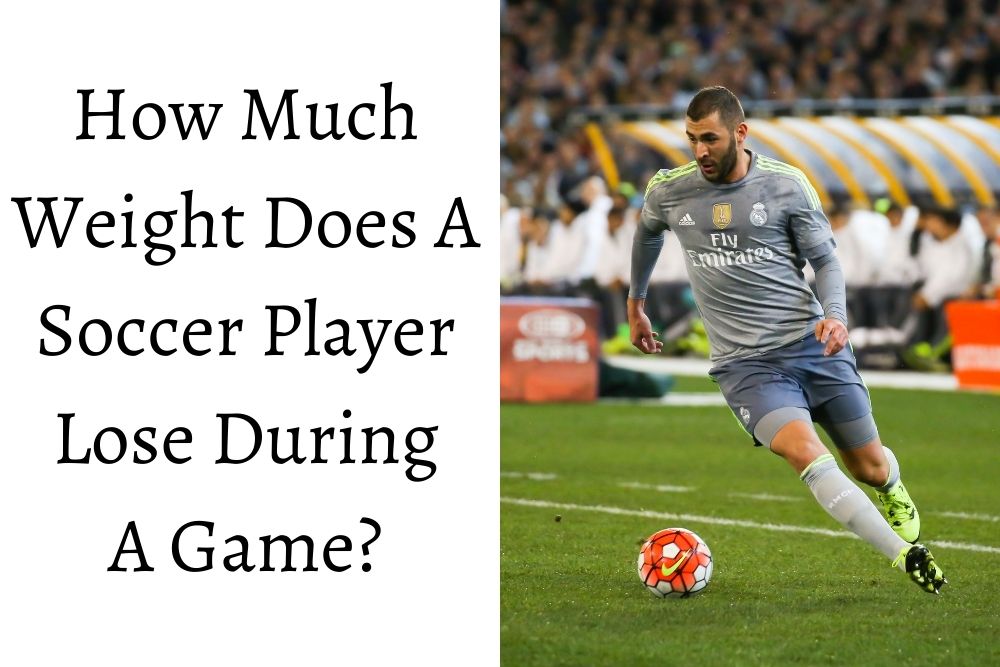Soccer is a game that demands constant exertion at varying levels of intensity, providing aerobic and anaerobic workouts. The University of Copenhagen has relayed that playing soccer regularly has been observed to lower body fat.
Fast-twitch muscle fibers are worked because powerful energy is poured into sprinting, jumping, changing directions quickly, including other motions.
Stored glucose is used up by fast-twitch fibers. This, in turn, sets free fat-burning hormones that their activity will persevere during and after a workout.
Dehydration is a major concern during play because fluid loss through sweating is inevitable. It is part of the reason why soccer players lose weight after a game.
The average human weight of an adult differs by continent. Whereas in Asia, it’s about 60kg (130 Lbs), it’s about 80kg (180 Lbs) in Africa and North America. In America, men are about 20 pounds heavier than women, making an average of about 200 pounds.
In this article, we examine the estimated weight loss of a soccer player in a game. We will also look at what’s obtainable in other variants of soccer, with weight loss per game.
Quick Navigation
How Much Weight Does a Soccer Player Lose During a Game?
Notable at this junction is the fact that not every player on a soccer team loses the same amount of weight in the same game and in the long run.
Soccer players lose a significant amount of weight after every game. Soccer players can lose as much as 2-3kg of their body weight during a match.
While calories are often the major parameter we look out for, water loss through sweating is another culprit often overlooked. Matches played under higher temperatures will result in more fluid loss than when played in cooler temperatures. Soccer players can lose as much as 2-3 liters of sweat from a single game.
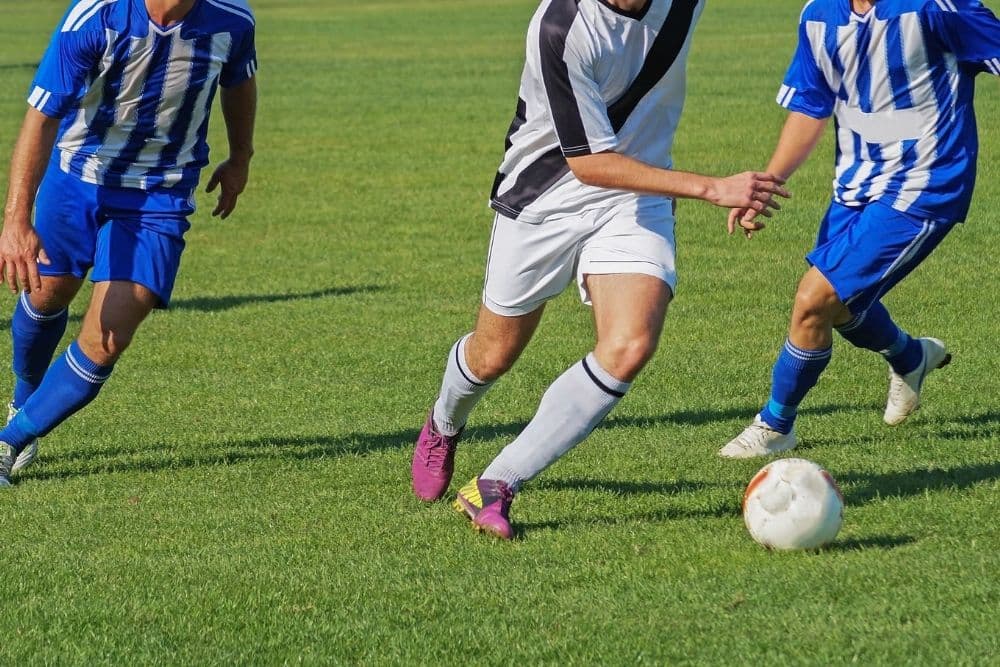
A good example of a soccer player losing much fluid during play is Brazilian striker Hulk. It is estimated that Hulk loses about 11lb (5kg) of sweat in a game! This may not be the norm for soccer players but it goes to show the extent to which soccer players can lose weight in just a single game.
For a player like Hulk, according to his club’s physio, Roberto Chiari, special attention is given to ensure he stays hydrated throughout his time on the pitch.
Players have different metabolic rates and this would determine, to a large extent, the amount of weight they can lose in a match game. This is because there are several factors one would need to consider as it relates to each player. These would include:
- Player’s Weight
- Duration of time play
- Position of the player on the pitch
- Total distance covered by the player
- Nature of player’s diet
- Fitness level
Player’s Weight
Some studies indicate that a bulky person has more weight to lose than someone with a lesser body build, under the same circumstances. To better understand this, a soccer player weighing 130-pounds will, in a minute of play, have fewer calories to burn than a 155-pounds player.
A player that sweats a lot will invariably lose more body fluid through sweating. Dehydration levels were tested on 20 Brazilian soccer players to see the rate of fluid loss. Bodyweight was between 139lb to 172lb (63kg to 78 kg).
At the end of the match, body mass loss was about 1kg while the average sweating rate and fluid loss were about 866mL per hour. At the end of the study, the loss in total body weight was a result of dehydration and burned calories.
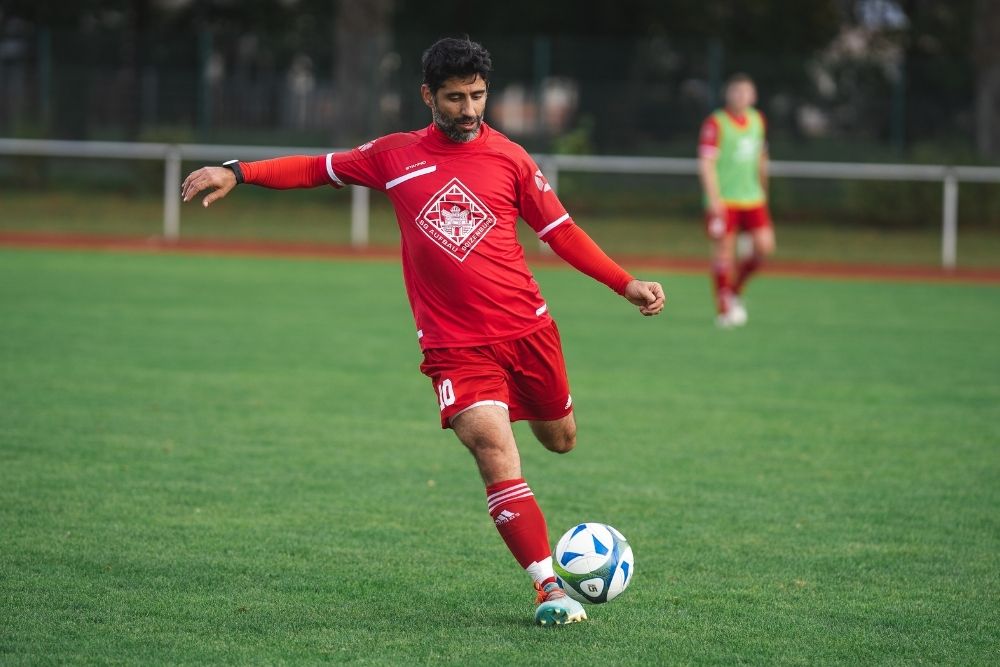
Duration of Time Played
The longer a player stays on the pitch, the more likely he’ll get dehydrated and lose weight. While the intensity of sweating varies with temperature, fluid loss is inevitable.
Players playing for more than 60 minutes in a game can lose as much as a liter of sweat. Rehydration during halftime is necessary or after every 20 minutes during hot seasons.
Position of the Player on the Pitch
Goalkeepers make the least amount of movement on the pitch. For obvious reasons, they are expected to guard the goalpost and area. Invariably, it’ll be expected that they’ll lose the least amount of weight during gameplay.
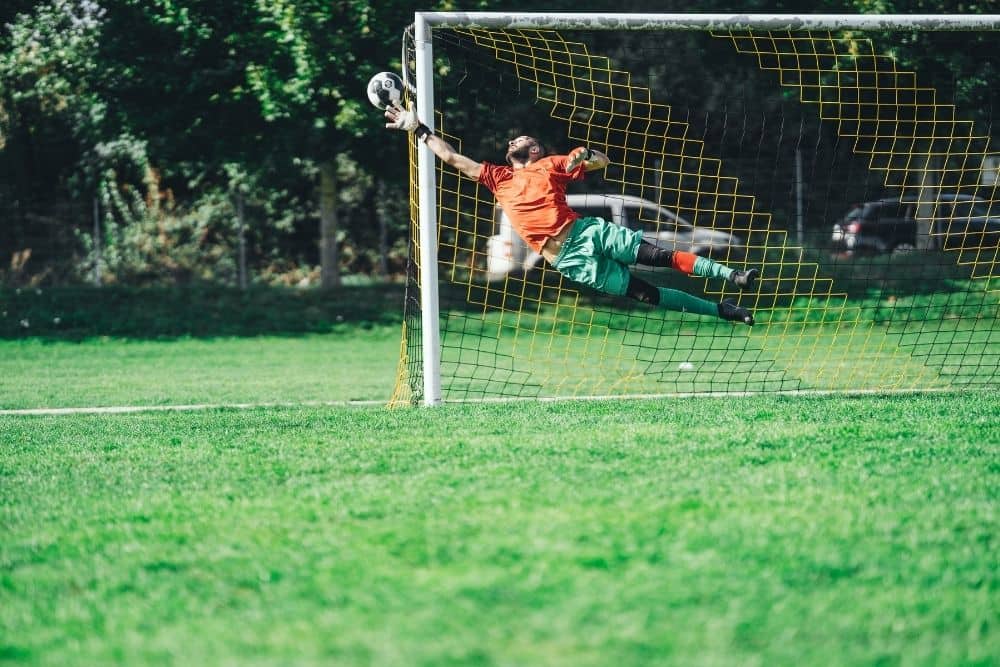
Midfielders, on the other hand, make the most runs during play. They’re expected to cover more distance to distribute and link play between defenders and forwarders. All things being equal on the field of play, they’ll experience more weight loss than their counterparts on the pitch.
Total Distance Covered by the Player
More active players tend to cover more distance on the field of play. Certain positions allow for more covered distances. Since running and walking are great ways to exercise, players engaging in these forms of movement to cover pitch ground will have more weight loss than others.
Weight loss will also occur as a result of dehydration. A player with a more covered distance can lose as much as 2-3kg in weight from sweating and fat burn.
Nature of the Player’s Diet
As an energy demanding sport, soccer players are encouraged to have a diet that consists of 60-65% Carbohydrates. Fat and protein should make up between 20-25% and 10-15% respectively.
The same holds true for staying hydrated during gameplay. Soccer players are advised to drink 200-400mL of cold fluid before the beginning of the game. This is a sure way to combat dehydration during the match.

Fitness Level
Every professional soccer player is required to undergo regular training sessions. This helps improve stamina, muscle memory, and general strength. With the help of periodization, professional soccer players can get the best out of their training schedule to keep them fit.
If you want to lose weight while playing soccer, you can manually calculate the number of calories you burn when you multiply your general body mass by the Metabolic Equivalent of Task (MET) and duration of soccer activity.
How Much Weight Does a Soccer Player Lose During a Game of Other Types?
Futsal
An hour’s play of futsal burns approximately 800 calories in a 190Ibs male player.
Research on weight loss and dehydration in English futsal players revealed an average of 1kg loss after gameplay of 48-60 minutes. The sweating rate was also documented to occur at an average of 10.5mL/minute of gameplay.
In March 2018, Researchgate released an article titled, ‘the effectiveness of futsal as a game-stimulated exercise for promoting weight loss and metabolic health in overweight/obese men.’ Linked with futsal is the near maximal heart rate when training is ongoing which has been observed to stimulate favorable metabolic and cardiorespiratory adaptations.
In determining if futsal can serve as an alternative exercise method to attain weight loss and promote metabolic health in overweight/obese men, eight overweight, untrained men aged between 26 and 32 years were participants in the 12-week study consisting of 4-aside matches with a game or two weekly.
The duration of each game was 60 minutes (4 * 10-min) with a rest period of three minutes in between games. A warm humid outdoor environment was where all sessions were held.
At baseline, blood samples were taken and analyzed for values of fasting blood glucose (FBG), triglycerides (TG), total cholesterol (TC), high-density lipoprotein (HDL-C), and low-density lipoprotein (LDL-C). Body composition was also taken note of before and after this study.
In the end, although body weight didn’t significantly change, body fat percentage dropped by an average of 4.5%. There were no changes in FBG, HDL-C, and LDL-C but TG levels increased.
The metabolic health parameters didn’t show any significant improvement. Futsal has the potential to produce greater benefits if higher intensities were maintained after rest periods.
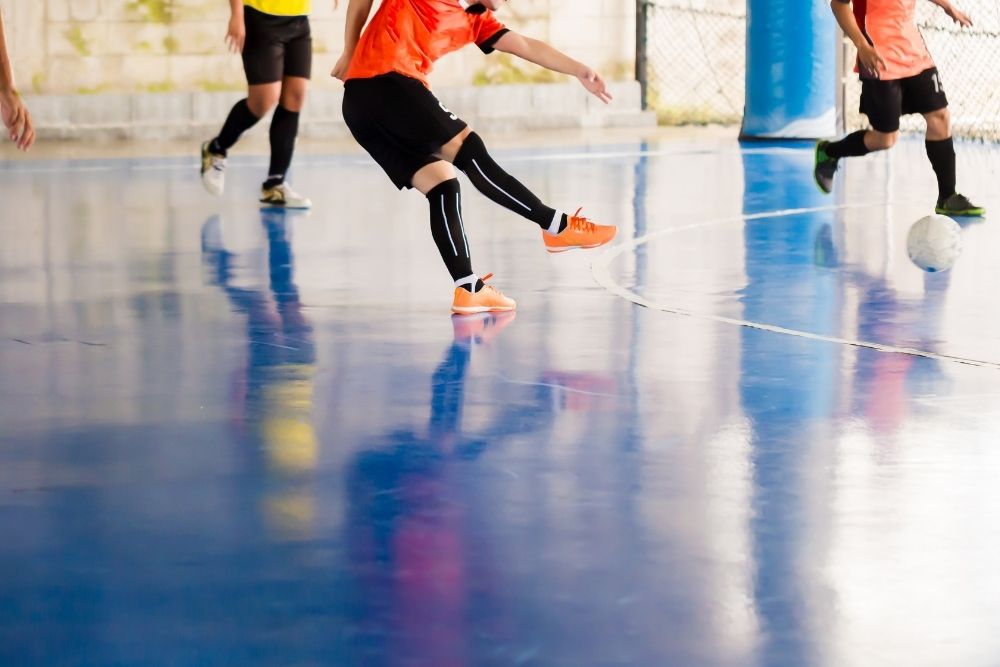
Beach Soccer
This doesn’t always have to be competitive. When you are out at the beach and besides swimming, surfing, snorkeling, kayaking, etc you want to engage in an activity that can help you lose weight. You can play beach soccer either with a team or you can simply kick around a soccer ball.
What it does is helps bolster your coordination, your endurance, and your heart rate is elevated. You are expending energy and sweating. Within a competitive setting, you will expend more energy.
However, whether it’s by yourself or you are competing, weight loss varies based on a few factors aforementioned. Also, the challenge of maintaining your balance on the soft, uneven surface in beach soccer contributes to weight loss and balance.

Indoor Soccer
During the cold winter, indoor soccer helps to stay fit. To perform well in this, players must possess endurance, agility, and speed. A high rate of activity must be maintained throughout the game.
Fluid loss through sweating is greatly reduced because of the indoor setting. This however doesn’t stop the sport from being intense. During competitive games, players can lose an average of 1kg in 60-minute gameplay.
Conclusion
A game of soccer burns an average of 780 calories depending on the player’s weight. The measure of the total weight loss by a player in a game is inclusive of fluid loss through sweating.
On average, soccer players can lose about 2-3 liters of sweat. Together with fat and calories burned, soccer players can lose an average of 2-3kg from their total weight by the end of a game.
Hi there, I’m Jay.
Soccer is everything in my life! My friends and I have created this blog with all our enthusiasm, passion, and understanding after years of playing pro soccer. Hope you will enjoy it!
